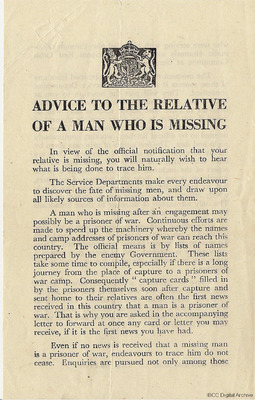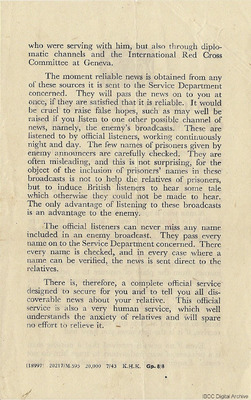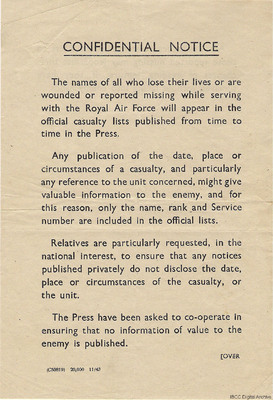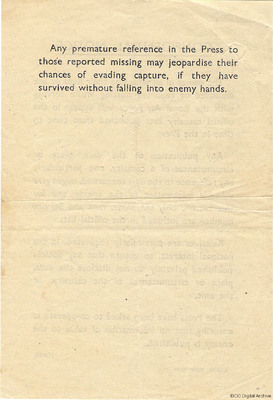Advice to the Relative of a Man who is Missing
Title
Advice to the Relative of a Man who is Missing
Description
Government advice to grieving relatives
Creator
Coverage
Language
Type
Format
Four printed sheets
Publisher
Rights
This content is available under a CC BY-NC 4.0 International license (Creative Commons Attribution-NonCommercial 4.0). It has been published ‘as is’ and may contain inaccuracies or culturally inappropriate references that do not necessarily reflect the official policy or position of the University of Lincoln or the International Bomber Command Centre. For more information, visit https://creativecommons.org/licenses/by-nc/4.0/ and https://ibccdigitalarchive.lincoln.ac.uk/omeka/legal.
Identifier
MWilsonRC1389401-170113-040001, MWilsonRC1389401-170113-040002, MWilsonRC1389401-170113-040003, MWilsonRC1389401-170113-040004
Transcription
[crest]
ADVICE TO THE RELATIVE OF A MAN WHO IS MISSING
In view of the official notification that your relative is missing, you will naturally wish to hear what is being done to trace him.
The Service Departments make every endeavour to discover the fate of missing men, and draw upon all likely sources of information about them.
A man who is missing after an engagement may possibly be a prisoner of war. Continuous efforts are made to speed up the machinery whereby the names and camp addresses of prisoners of war can reach this country. The official means is by lists of names prepared by the enemy Government. These lists take some time to compile, especially if there is a long journey from the place of capture to a prisoners of war camp. Consequently “capture cards” filled in by the prisoners themselves soon after capture and sent home to their relatives are often the first news received in this country that a man is a prisoner of war. That is why you are asked in the accompanying letter to forward at once any card or letter you may receive, if it is the first news you have had.
Even if no news is received that a missing man is a prisoner of war, endeavours to trace him do not cease. Enquiries are pursued not only among those
[page break]
who were serving with him, but also through diplomatic channels and the International Red Cross Committee at Geneva.
The moment reliable news is obtained from any of these sources it is sent to the Service Department concerned. They will pass the news on to you at once, if they are satisfied that it is reliable. It would be cruel to raise false hopes, such as may well be raised if you listen to one other possible channel of news, namely, the enemy’s broadcasts. These are listened to by official listeners, working continuously night and day. The few names of prisoners given by enemy announcers are carefully checked. They are often misleading, and this is not surprising, for the object of the inclusion of prisoners’ names in these broadcasts is not to help the relatives of prisoners, but to induce British listeners to hear some tale which otherwise they could not be made to hear. The only advantage of listening to these broadcasts is an advantage to the enemy.
The official listeners can never miss any name included in an enemy broadcast. They pass every name on to the Service Department concerned. There every name is checked, and in every case where a name can be verified, the news is sent direct to the relatives.
There is, therefore, a complete official service designed to secure for you and to tell you all discoverable news about your relative. This official service is also a very human service, which well understands the anxiety of relatives and will spare no effort to relieve it.
ADVICE TO THE RELATIVE OF A MAN WHO IS MISSING
In view of the official notification that your relative is missing, you will naturally wish to hear what is being done to trace him.
The Service Departments make every endeavour to discover the fate of missing men, and draw upon all likely sources of information about them.
A man who is missing after an engagement may possibly be a prisoner of war. Continuous efforts are made to speed up the machinery whereby the names and camp addresses of prisoners of war can reach this country. The official means is by lists of names prepared by the enemy Government. These lists take some time to compile, especially if there is a long journey from the place of capture to a prisoners of war camp. Consequently “capture cards” filled in by the prisoners themselves soon after capture and sent home to their relatives are often the first news received in this country that a man is a prisoner of war. That is why you are asked in the accompanying letter to forward at once any card or letter you may receive, if it is the first news you have had.
Even if no news is received that a missing man is a prisoner of war, endeavours to trace him do not cease. Enquiries are pursued not only among those
[page break]
who were serving with him, but also through diplomatic channels and the International Red Cross Committee at Geneva.
The moment reliable news is obtained from any of these sources it is sent to the Service Department concerned. They will pass the news on to you at once, if they are satisfied that it is reliable. It would be cruel to raise false hopes, such as may well be raised if you listen to one other possible channel of news, namely, the enemy’s broadcasts. These are listened to by official listeners, working continuously night and day. The few names of prisoners given by enemy announcers are carefully checked. They are often misleading, and this is not surprising, for the object of the inclusion of prisoners’ names in these broadcasts is not to help the relatives of prisoners, but to induce British listeners to hear some tale which otherwise they could not be made to hear. The only advantage of listening to these broadcasts is an advantage to the enemy.
The official listeners can never miss any name included in an enemy broadcast. They pass every name on to the Service Department concerned. There every name is checked, and in every case where a name can be verified, the news is sent direct to the relatives.
There is, therefore, a complete official service designed to secure for you and to tell you all discoverable news about your relative. This official service is also a very human service, which well understands the anxiety of relatives and will spare no effort to relieve it.
Collection
Citation
HM Government, “Advice to the Relative of a Man who is Missing,” IBCC Digital Archive, accessed November 14, 2024, https://ibccdigitalarchive.lincoln.ac.uk/omeka/collections/document/35668.
Item Relations
| Item: Advice to the relative of a man who is missing | dcterms:relation | This Item |




